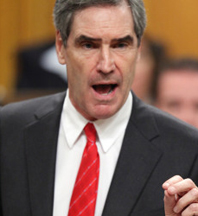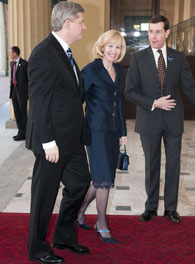Is end of Canadian Liberals’ long ride as natural governing party at hand, at last?
Oct 21st, 2009 | By Citizen X | Category: In Brief
Liberal Leader Michael Ignatieff attacks the Harper government during Question Period in the Canadian House of Commons on Tuesday, October 20, 2009. The Canadian Press.
[UPDATED OCTOBER 22]. Yesterday Liberal leader Michael Ignatieff told reporters that “we won’t support the government but, at the same time, we won’t try to defeat the government each time” the opportunity arises either. Or, the “Liberals will have at least three more opposition days before Christmas but … they won’t use those days to force confidence votes.”
Mr. Ignatieff went on: “we won’t support these people, because we’re the opposition. But we’re not trying to create opportunities to trigger an election … Canadians have clearly said they don’t want an election, and they haven’t just said that to me, they’ve told that to all the parties, and we have to respect what the Canadian voters think.”
This suggests Stephen Harper’s Conservative minority government “will remain in power until at least next spring’s federal budget.” At that juncture there are some reasons to believe that neither the Liberals nor the New Democrats will support the budget – which could throw the fate of the universe (once again) into the hands of Gilles Duceppe’s Bloc Quebecois.
Meanwhile, the Ignatieff Liberals have now backed off their earlier resolve to bring down the government, come what may. And the latest batch of opinion polls suggests the Harper Conservatives could be close to winning a majority of parliamentary seats in the next federal election. (Though pollster Darrell Bricker has raised grounds for caution here, in the western concentration of the Conservative vote.)

Prime Minister Stephen Harper and wife Laureen arrive at a reception for world leaders attending the G20 summit at Buckingham Palace on April 1, 2009 in London, England. Will he achieve what no other Canadian Conservative leader since John A. Macdonald has managed – with or without a majority government?
Whatever else, it all lends some fresh interest to historian Michael Bliss’s recent speculation that “the balance between Canada’s major parties is at or very near a historic tipping point. Stephen Harper’s Conservatives have seized the central ground of the political spectrum and are poised to become the country’s natural governing party. The Liberal Party is floundering in uncertainty and disunity … and badly led. We appear to be on the verge of the great historic shift in party fortunes that Conservatives have hoped for, but have regularly failed to achieve, for more than a century.”
Personally, I still have big doubts. It remains a stubborn fact that the Harper Conservatives have yet to win a mere majority government – of the sort that Brian Mulroney managed twice, as recently as the 1980s. We may be on the verge of some great historic shift in Canadian politics. But there has to be much more hard evidence for Professor Bliss’s theory to carry serious weight. The next big test will be the next federal election, whenever it comes. And even in the latest Tory-friendly EKOS poll, the combined progressive vote of Liberals, New Democrats, and Greens together still adds up to 50.3%, compared to 40.7% for the Conservatives (and leaving the BQ out altogether). In any case, one way or another, time will tell.
UPDATE OCTOBER 22: Jane Taber reports two new polls on Canadian federal party standings in today’s Globe and Mail: Pollster Nik Nanos’s “latest survey shows the Conservatives with 39.8% support of Canadians compared to 30% for the Ignatieff Liberals, [and] 16.6% for the NDP.” The “Greens are at 4.6% and the Bloc at 8.9%.”
A “second poll today, from EKOS, has the Harper Conservatives supported by 38.3%Â of Canadians compared to 27.1% for the Ignatieff Liberals. The NDP are at 14.5%, the Green Party is at 11% and the Bloc is at 9% … This is a change from last week’s EKOS survey in which the Tories were at a high of 40.7% and the Liberals at 25.5%.”

